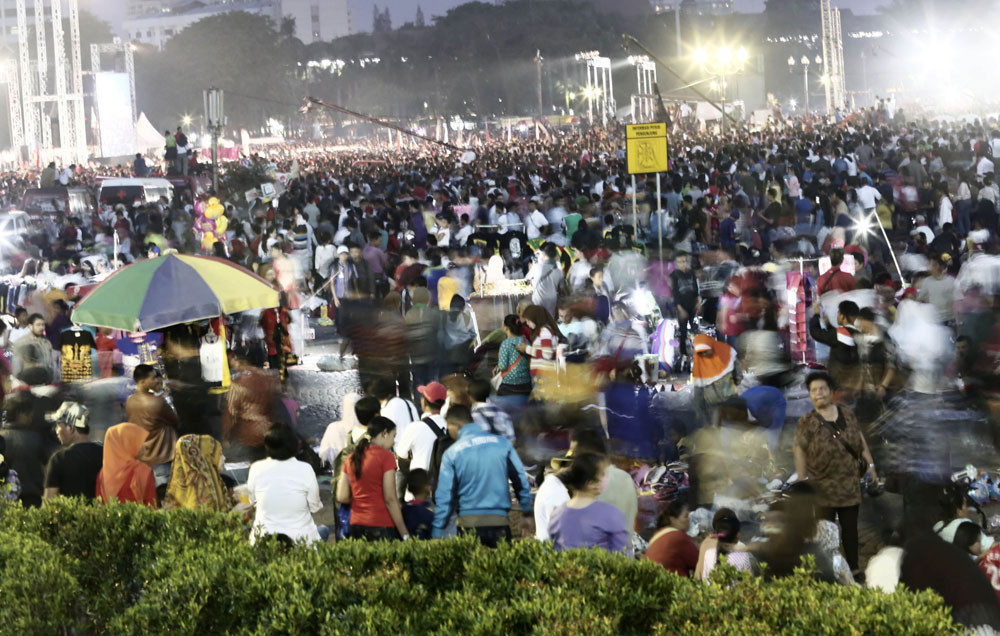Popular Reads
Top Results
Can't find what you're looking for?
View all search resultsPopular Reads
Top Results
Can't find what you're looking for?
View all search resultsWorld Population Day: BKKBN campaigns against unwanted pregnancy
Change text size
Gift Premium Articles
to Anyone
T
he National Population and Family Planning Board (BKKBN) remains committed to the family planning campaign amid concerns about the impact of the COVID-19 pandemic on demographics.
The observance of World Population Day on July 11 reminds the world that efforts must be pushed further to curb pregnancy rates, which are feared to be on the rise because of the implementation of “stay at home” protocol.
The world's population is expected to increase by 2 billion people in the next 30 years, from 7.7 billion in 2019 to 9.7 billion in 2050.
Nine countries, including Indonesia, are predicted to reach more than half the projected growth between now and 2050.
However, the COVID-19 pandemic might bring the number further up as the pandemic also has a tremendous impact on access to family planning (KB) services as well as sexual reproductive health information.
Countries throughout the world, including Indonesia, are now struggling to ensure that services in family planning and reproductive health programs remain available.
As one of the government agencies involved in health matters, the BKKBN supports the national COVID-19 task force in combating the spread of the coronavirus through collaboration with nongovernmental organizations.
With the Johns Hopkins Communication Program Center (JHCCP Indonesia), the BKKBN has developed a communications strategy that includes the employment of 15,000 family planning field officers (PLKB).
This aims to strengthen the implementation of programs in the field, especially family planning services for fertile age couples in regard to the supply of contraceptives.
Fear of contracting the virus has prevented women from going to health facilities. There is also the potential for supply chain disruption in the availability of contraceptives in some areas, which may might result in unwanted pregnancy.
As many as 47 million women in the world, as reported by the United Nations Population Fund (UNFPA), are unable to access modern contraception, 7 million of whom experience unwanted pregnancy.
The UNFPA has warned that 31 million cases of gender-based violence will occur if lockdowns continue for six months in 114 low- and middle-income countries.
A swath of misinformation has the potential to increase the vulnerability of the public health system.
Uttara Bharath Kumar, John Hopkins' senior technical advisor for the Communication Program, said that many people were fed misinformation, which could result in women being reluctant to seek out health services.
On the other hand, limited access to information among marginalized communities contributes to the difficult situations while efforts and commitment are needed to encourage new behavior in preventing the COVID-19 outbreak, such as with washing hands and social distancing.
The BKKBN’s demographic initiative has been crucial considering that the community has the right to get family planning access even in the midst of a pandemic, as contraception is a basic need.
The BKKBN is focusing on people’s needs, especially those who are far from health facilities and deprived of access to family planning services.
The family planning agency is working with 500 local governments to ensure an undisruptive distribution of contraceptives from warehouses to 18,000 health facilities in regencies and municipalities, aided by PLKB officials and the Indonesian Midwives Association (IBI).
They work on the frontline, not only helping people to overcome the pandemic but also bringing their awareness about unwanted pregnancy so that the nation can handle its demographic issues in line with the Sustainable Development Goals (SGD).
Source:
https://www.unfpa.org/events/world-population-day










